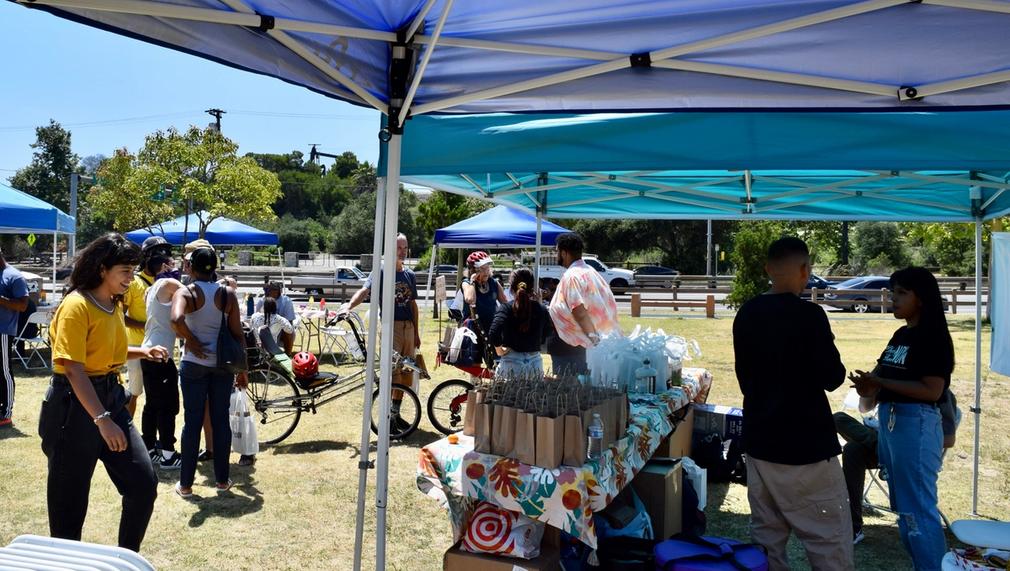Support for Formerly Incarcerated folks
Dignity and Power Now's Mutual Aid program is a radical effort to build power with Black and Brown system-impacted community members through economic and basic needs relief. If awarded this grant, we hope to continue and expand our reach toward the goal of abolition, and specifically, transformative justice and healing justice for all incarcerated people, their families, and communities.

What is the primary issue area that your application will impact?
Opportunities for People Who Have Been Incarcerated
In which areas of Los Angeles will you be directly working?
Central LA
South LA
County of Los Angeles
In what stage of innovation is this project, program, or initiative?
Expand existing project, program, or initiative
What is your understanding of the issue that you are seeking to address?
Los Angeles is the epicenter of mass incarceration - its effects are widespread and deadly and services for this population are scarce and inadequate. While there may be a lack of support services available for low-income community members, there are even less services available for individuals with criminal records. Despite the traumatic, intergenerational, and sometimes fatal impacts of incarceration, many aid programs require system-impacted community members to jump through so many bureaucratic and technological hoops that healing and thriving becomes out of reach. Some programs prohibit system-impacted community members from receiving services altogether. Our community members are often denied employment because of their records and lack of access to job training. Many struggle to keep food on the table, and are one or two paychecks from houselessness. This program can serve as a first step in alleviating the economic and emotional burden of incarceration.
Describe the project, program, or initiative this grant will support to address the issue.
The Mutual Aid program creates opportunities for system-impacted individuals and alleviates economic insecurity by offering rental and financial support, which prevents disconnections of utility services and evictions. The program also serves to facilitate the maintenance of household sufficiency through the provision of supply-based resources including food, clothing, and infant and household supplies. It also addresses the need for long-term healing, wellness, and connection by providing referrals to various community groups including leadership development and healing spaces for system-impacted individuals and families, and empowered spaces to learn organizing skills and share one's story. The program prioritizes authentic connection with community members within LA County and upon receiving services, offers connections to coalition and advocacy opportunities that are actively dismantling the oppressive systems that allow the community to be in such dire need in the first place. There are over 1,000 individuals waiting to hear when the Mutual Aid program begins accepting new applications. The program has helped over 2,006 system-impacted households, over 81% of recipients identify as Black and Brown and 90% have been incarcerated. Not only do we help individuals get their basic needs met, we often lend an ear to listen to people's stories. There is a growing need for programs like this and being awarded this grant will help us continue and expand this work.
Describe how Los Angeles County will be different if your work is successful.
Testimonials from community members show how much the support helped them to keep their phones on, pay for childcare, which all allowed them to keep a job or find a new one. This support has a direct impact on keeping our community from being evicted and being able to buy food for their families. However, $1,000 only goes so far, especially in Los Angeles. This program is only addressing the tip of the iceberg and with this grant, we hope to continue and expand this program. A large part of our system-impacted community still returns home only to be houseless and without the support system, they deserve. Our communities are still over-policed and under-resourced. The goal has always been abolition. Therefore, in order to say this program is a success, we would need to see a city that is based on care rather than cages and where there are enough resources to allow families to thrive. Specifically, we would love to eventually provide housing and more wrap-around support.
What evidence do you have that this project, program, or initiative is or will be successful, and how will you define and measure success?
Aside from the community's testimonials, which often detail how the financial support allowed them to put food on the table or keep utilities on or how the rental support prevented them from being evicted, we also perform follow-up calls with community members who feel empowered by the work we do. These follow-up calls allow us to hear how each person was impacted by the support and how they'd like to get more involved in the abolition movement. Many of our Mutual Aid recipients go on to be leaders within this movement and some have even represented our organization in coalition spaces. Measuring the success and impact of this program is rooted in storytelling and membership engagement. Since 2022, 106 community members (and counting!) have asked to be connected to other DPN programs. This huge milestone shows how with a little financial and basic needs support, community members can afford to be more active within their communities and are eager to learn and support one another.
Approximately how many people will be impacted by this project, program, or initiative?
Direct Impact: 60
Indirect Impact: 160